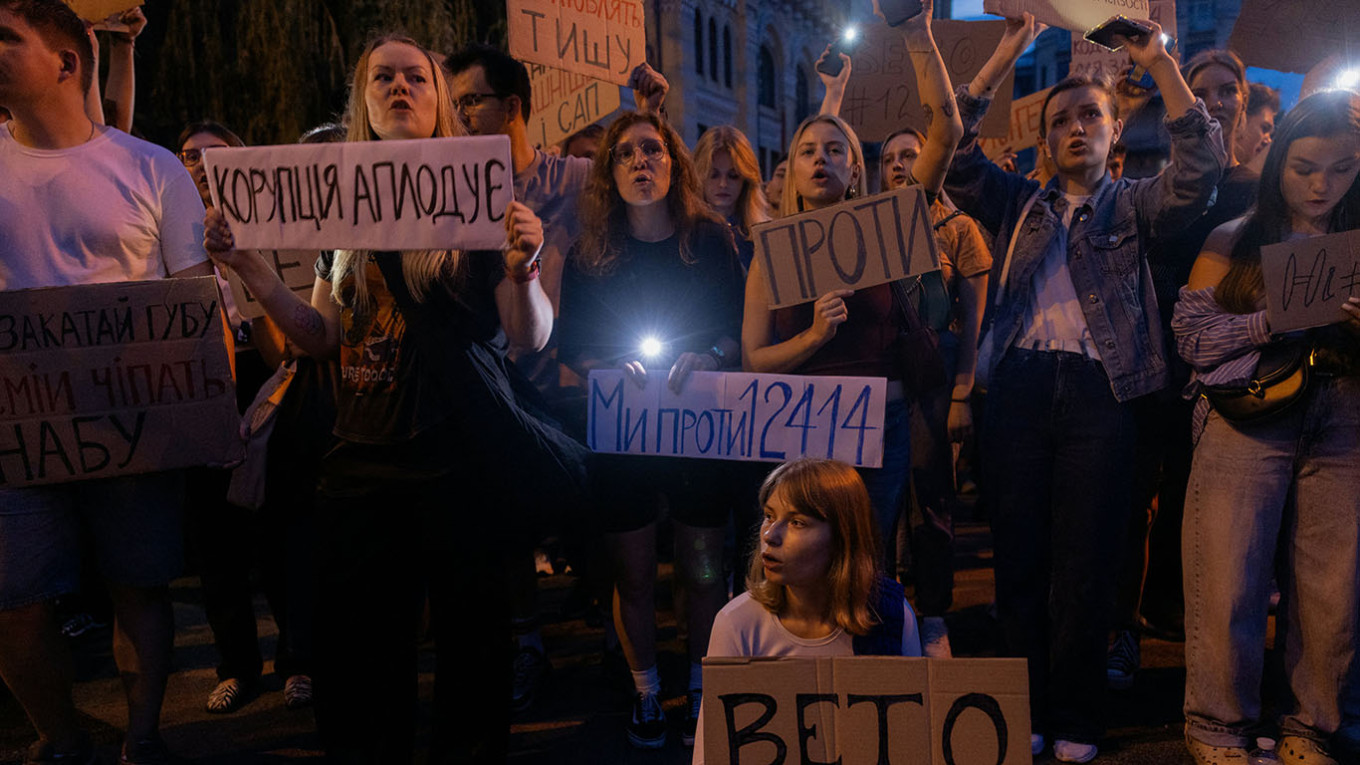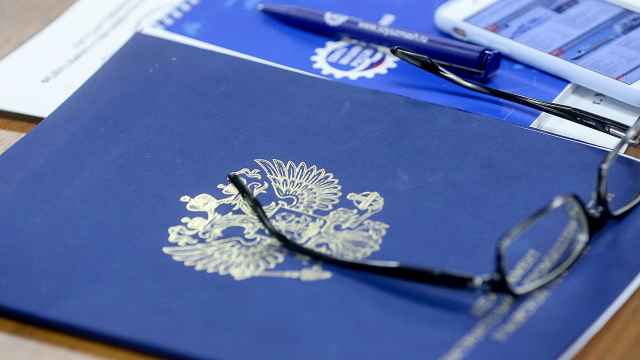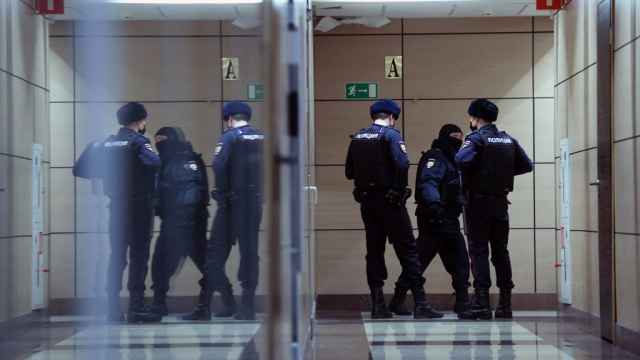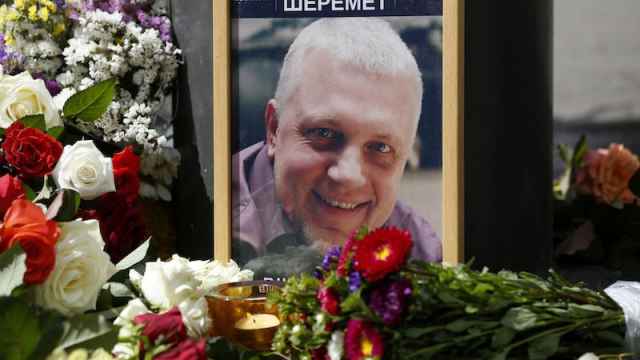The protests that filled central Kyiv following the passage of a bill that weakens Ukraine’s key anti-corruption institutions are not a sign of weakness for the embattled country. It is instead a sign of the Ukrainian peoples’ desire to continue the trajectory toward a future anchored in the rule of law, which their countrymen have fought and died for since 2014.
President Volodymyr Zelensky quickly sensed the severity of the backlash as a cross-party groups introduced a bill aimed at restoring the organizations’ independence. But by that time, it has already proved a gift to Moscow as well as Kyiv’s critics, who have already seized upon the chance to justify their claims that Ukraine was too corrupt to be worthy of support.
Kremlin spokesman Dmitry Peskov stoked these claims by saying that critics were right to be concerned about Ukrainian corruption frittering away the billions of dollars they sent in aid. But Ukraine has made bold steps in uncovering corruption, even while its energy is focussed on defending itself.
At first, Zelensky and his allies defended the law as a national security measure, citing alleged Russian infiltration of National Anti-Corruption Bureau (NABU) and Anti-Corruption Prosecutor’s Office (SAPO). Yet the timing and method of the law’s passage, as well as its structural consequences, do not sit well with Ukrainians.
Passed through opaque amendments tacked onto a separate wartime bill, the legislation transferred substantial authority to the Prosecutor General — widely seen as loyal to the administration — and stripped SAPO of its procedural independence. Legal analysts and civil society groups described the move as a major rollback of post-Euromaidan reforms and a dangerous step toward the politicization of anti-corruption investigations.
Just days before the law was signed, NABU named Oleksiy Chernyshov, a former Deputy Prime Minister, a suspect in a major corruption case. He is the highest-ranking figure ever targeted by the agency. The Presidential Administration subsequently launched a sweeping reshuffle of key officials in a move widely viewed as an effort to pre-empt accountability rather than enhance it.
To many Ukrainians, this looks like an attempt to shield powerful actors from scrutiny, not to root out Russian influence. This law strikes such a nerve precisely because Ukrainians have sacrificed so much to fight corruption, to defend democracy and build a future closer to Europe. As one protester on Ivan Franko Square explained to me, “after everything we fought for in 2013-2014, I do not understand why we have to come back and do it again –– now during a war,” referring to the bloody Euromaidan revolution that saw the deaths of over 100 protesters, toppled pro-Russian President Yanukovich, set Ukraine on its path to EU integration.
The outcry in Kyiv is not a rejection of the Ukrainian state, nor a descent into chaos. In fact, it is a reflection of the strength and maturity of Ukraine’s civic identity, despite a full-scale war with Russia. Participants were peaceful, patriotic and from all areas of Ukrainian society. They demanded accountability, not regime change. They sang the national anthem and waved Ukrainian flags. Their message was to the point: this is not what they have been fighting for.
Some in the West have already seized upon this moment to reignite old, simplistic narratives about corruption in Ukraine. For example, anti-Ukrainian U.S. Congresswoman and conspiracy theorist Marjorie Taylor Greene tweeted that the protests were happening because Zelensky is a “dictator” who refues to end the war. “Good for the Ukrainian people! Throw him out of office! And America must STOP funding and sending weapons!!!”
This is a dangerous and dishonest misrepresentation that overlooks the remarkable progress Ukraine has made. Since 2013, the country has gained 10 points on Transparency International’s Corruption Perceptions Index, reaching 35 on a scale where 100 is the lowest level of corruption. That may not seem like much, but it is remarkable in a world where most countries have either stagnated or declined.
Critics overlook that the protests themselves are proof that Ukrainians will not quietly accept a slide backward. Most importantly, it fails to grasp that Ukraine’s European path is not negotiable — not to Ukrainians and not to those standing in solidarity with them.
Indeed, what anti-Ukrainian voices in the West miss is that this moment is not a validation of their skepticism — it is a demonstration of why Ukraine remains a worthy cause to support. The fact that Ukrainian citizens are willing to protest in wartime, under martial law, without any protection from opposition parties or radical groups, is a testament to the strength of democratic consciousness in this country.
The international community can still play a critical role by doubling down on its support for reform and insisting that the country stay the course it set in 2014. Western governments must make clear to Zelensky that the democratic values Ukrainians have bled for since 2014 must be upheld at all costs and that any form of democratic backsliding is unacceptable. European Commission President Ursula von der Leyen called Zelensky to demand an explanation and remind him of the progress Ukraine must continue to make as a candidate for EU membership.
Ukraine’s fight has always been two-fold: resisting Russian aggression on the battlefield and overcoming the U.S.S.R.'s legacy at home. The two are inseparable. A Ukraine that wins the war at the cost of the rule of law will neither be secure, nor a credible partner for the West.
That is why Law 12414 matters and Ukrainians instantly took to the streets to oppose it. By weakening the very institutions meant to investigate elite corruption, the government risks alienating both its own citizens and its international supporters. It risks fueling public cynicism, undermining the draft effort, and damaging wartime unity. It risks providing easy talking points to those in the United States and the European Union who seek to curtail assistance.
It also gives ammunition to Russia, which unsurprisingly exploited this moment in its disinformation campaigns. As the Kremlin sneered, state media gleefully reposted Greene’s tweet as vindication Russian propagandist and extreme right-wing nationalist Alexander Dugin wrote on his Telegram channel that the anti-corruption agencies were a CIA front and that the “Deep State” was trying to throw Zelensky out.
Zelensky has admitted that hurrying through the bill without a dialogue was a mistake. Lawmakers will consider a replacement bill on in an emergency session on July 31 For the protesters, however, reversing course will only be meaningful if it produces concrete change.
Once again, Ukrainians have made their position clear. Their protests are not a threat to the country — they are its conscience. They are standing up not just against a law, but for the future they were promised and that they are still fighting to secure for over 11 years on the streets in and the trenches. Importantly, it demonstrates they have the power to force their government to change course — something that has not happened in Russia.
The West should take note. Ukrainians have not lost their way. They still have some distance to go, but are showing us they know that accountability is the way forward.
A Message from The Moscow Times:
Dear readers,
We are facing unprecedented challenges. Russia's Prosecutor General's Office has designated The Moscow Times as an "undesirable" organization, criminalizing our work and putting our staff at risk of prosecution. This follows our earlier unjust labeling as a "foreign agent."
These actions are direct attempts to silence independent journalism in Russia. The authorities claim our work "discredits the decisions of the Russian leadership." We see things differently: we strive to provide accurate, unbiased reporting on Russia.
We, the journalists of The Moscow Times, refuse to be silenced. But to continue our work, we need your help.
Your support, no matter how small, makes a world of difference. If you can, please support us monthly starting from just $2. It's quick to set up, and every contribution makes a significant impact.
By supporting The Moscow Times, you're defending open, independent journalism in the face of repression. Thank you for standing with us.
Remind me later.








